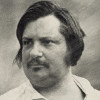“ For nothing is allowed to drop out of our common life. ”
Honoré de Balzac, Letters of Two Brides (1841). copy citation
| Author | Honoré de Balzac |
|---|---|
| Source | Letters of Two Brides |
| Topic | life |
| Date | 1841 |
| Language | English |
| Reference | |
| Note | Translated by R. S. Scott |
| Weblink | http://www.gutenberg.org/files/1941/1941-h/1941-h.htm |
Context
“A smile which is always there, yet always fresh through the play of subtle fancy, a speaking smile which makes of the lips a storehouse for thoughts of love and unspoken gratitude, a smile which links present joys to past. For nothing is allowed to drop out of our common life. The smallest works of nature have become part and parcel of our joy. In these delightful woods everything is alive and eloquent of ourselves. An old moss-grown oak, near the woodsman's house on the roadside, reminds us how we sat there, wearied, under its shade, while Gaston taught me about the mosses at our feet and told me their story, till, gradually ascending from science to science, we touched the very confines of creation.”
source



